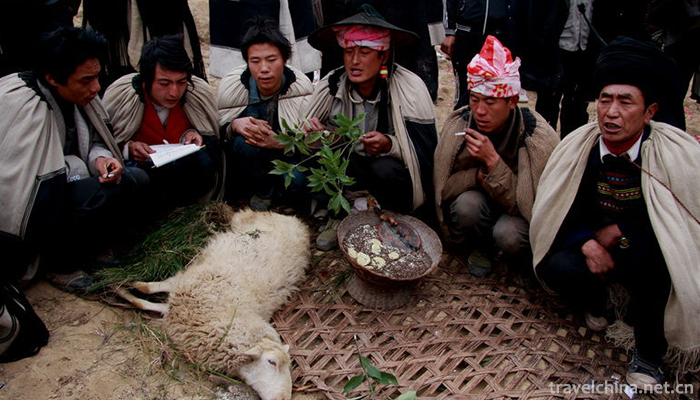Bemo music
Bemo music
Qubila fire is well known in Meigu County, Liangshan Prefecture. He is not only a highly respected Yi Dabimo, but also a representative successor of national intangible cultural heritage projects. His Bimo music is a combination of moral education, knowledge imparting and literary entertainment. Through symbolic and complicated rituals, it explores people's life thinking and promotes people's spiritual outlook.
In the early forties of this year, Qubila Huo was born in the Bimo family of Meigu. He studied and engaged in the traditional Bimo field of the Yi people for more than twenty years. Since he was 17 years old, he has been on the road of Bimo. Over the years, he has studied knowledge imparting and inheriting simultaneously, enriching his personal insights in the field of Bimo and Bimo music. He advocated Bimo music concept and personally presided over ceremonies in recent years are well known.
The first meeting with Qubila Fire was held in Meigu County in late December 2017 at the site of a national non-heritage project, the ritual of ancestor worship by Nimu Chobi of the Yi Nationality. In response to the reporter's questions, he systematically narrated the knowledge inheritance and connotation of Bimo music culture of the Yi nationality. He told reporters that Bimo music integrated the ancient language, writing, history, genealogy, astronomy, calendar, geography, folklore, ethics, literature and art of the Yi people. From its origin, development, prosperity to prosperity, it not only contributed to the convergence of the ideological field of the Yi people, but also penetrated into all aspects of the social life of the Yi people, with a far-reaching impact. "Encyclopedia" passed down from generation to generation.
It is understood that Bimo music is a kind of traditional music approved by the State Council in 2014 and listed in the fourth batch of national intangible cultural heritage list. Trabila fire was the representative inheritor of Bimo music in the provincial intangible cultural heritage project. Recently, among the representative successors of the fifth batch of national intangible cultural heritage projects announced by the Ministry of Culture, Qubila Huo ranked on the list and became the successor of Liangshan non-heritage "national name".
In an interview with reporters, Qubila Huo is doing the guiding link of the ritual of "Nimu Chobi" ancestor worship. He shows in detail the unique and essence of Bimo music. In Qubilahe's words, a "Guide to the Way" is a vivid picture of the migration of the ancestors of the Yi people, with the footprints of the Yi people's history permeating between the lines.




-
1.Old Beijing fried Morchella
The most famous famous food in Beijing is old Beijing tripe and Beijing roast duck. As for the oldest and most prosperous snacks in Beijing, belly burst is definitely the best among them.
Time 2018-10-27 -
2.China Coal Museum
The China Coal Museum is located at the intersection of Yingze Street and Jinci Road in Taiyuan City. It was completed and opened on September 30, 1989
Time 2018-12-22 -
3.Asihatu Stone Forest
Chaihe Tourist Scenic Spot has a total area of 1368.7 square kilometers, which is a national 5A tourist scenic spot. The area of Alshan City in Xing'an League is 7408.7 square kilometers, and Chaihe T
Time 2019-01-02 -
4.Guangxi Science and Technology Museum
Guangxi Science and Technology Museum is located in Nanning National Avenue. It was established in March 2006 and started construction in December. It covers an area of 14655 square meters
Time 2019-01-13 -
5.Zhangyu Wine Culture Museum
Zhangyu Liquor Culture Museum is one of the few professional museums in the world wine industry. It is located at the original site of Zhangyu Company, Da Ma Lu, Zhifu District, Yantai City, Shandong
Time 2019-03-17 -
6.Fish Swallow in Bazhen Fresh Soup
Ingredients: Six or two fish swallows are served well. Lentinus edodes, crab willow, Jinhua ham, clam, shrimp
Time 2019-03-27 -
7.Hanchuan good books
Hanchuan Shanshu is a kind of traditional folk music which combines rap and singing in Hubei Province. Since the Qianlong period of the Qing Dynasty, it has a history of 260 years.
Time 2019-05-02 -
8.Jiangnan bamboo
Chinese traditional instrumental music, silk and bamboo, is popular in southern Jiangsu and Zhejiang. After the Revolution of 1911, great progress was made in Shanghai
Time 2019-05-05 -
9.Traveling Books in Ningbo
Ningbo Walking Book, originally known as "Lotus Document" or "Plough Document", is one of the traditional local operas in Ningbo, Zhejiang Province. Sing in Ningbo dialect. Ningbo
Time 2019-06-08 -
10.The legend of Qiren worrying about heaven
On November 11, 2014, the legend of Qiren worrying about heaven was approved by the State Council to be included in the fourth batch of national intangible cultural heritage list.
Time 2019-06-10 -
11.Tianmen Folk Song
Tianmen folk song is the traditional folk music of Hubei Province. Tianmen folk song has its unique style characteristics. It is not as rough and elegant as plateau folk song, nor as broad and long as
Time 2019-06-20 -
12.Smelting and Casting Techniques of Pig Iron in Yangcheng
Yangcheng pig iron casting technology was invented in the 6th century BC. Yangcheng pig iron smelting and casting technology in the smelting and casting process first crushed the ore, then roasted at
Time 2019-07-10